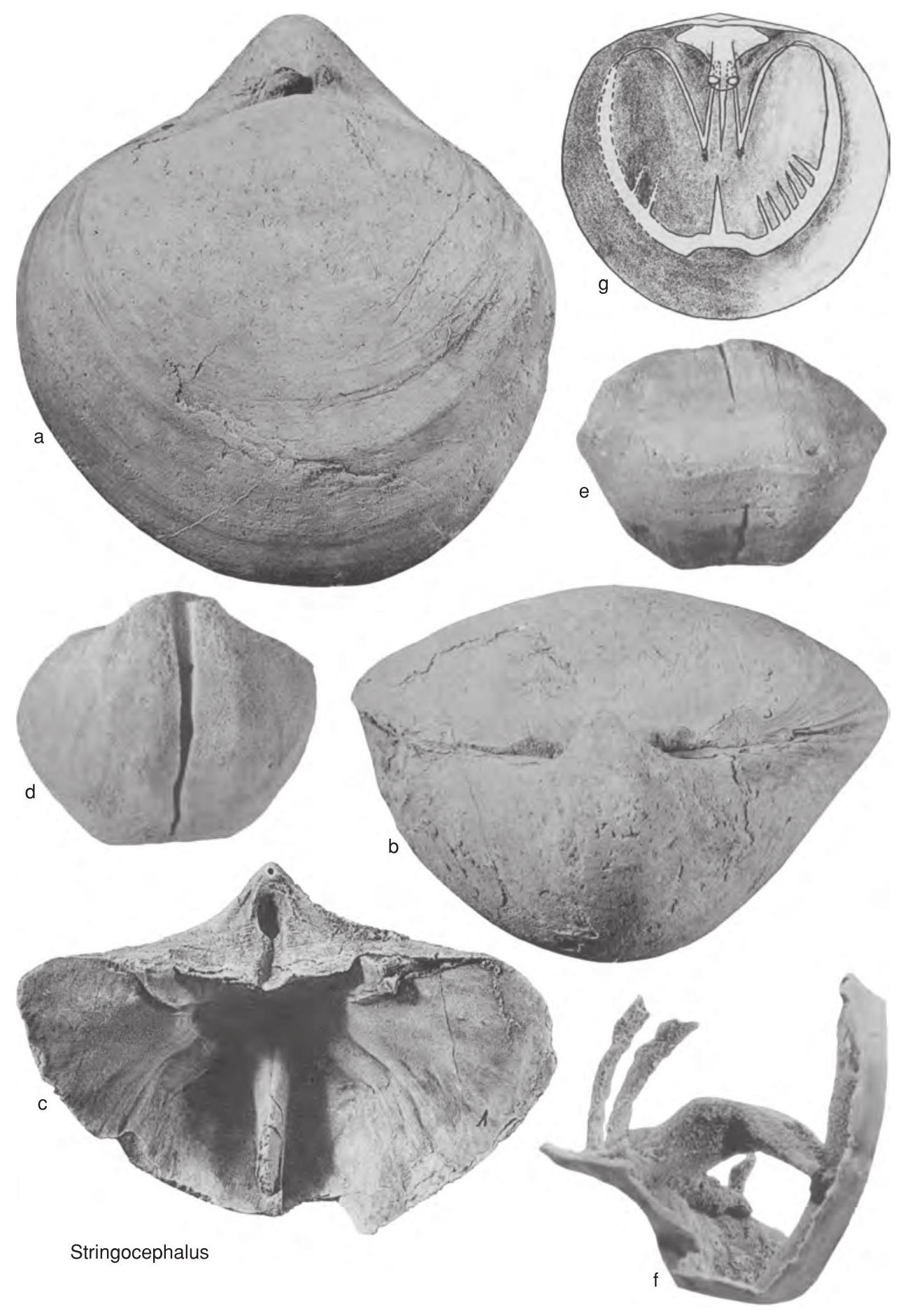Welcome to the Treatise on Invertebrate Paleontology!
Please enter a genera name to retrieve more information.

Stringocephalus
Classification
Phylum:
Brachiopoda
Subphylum:
Rhynchonelliformea
Class:
Rhynchonellata
Order:
Terebratulida
Suborder:
Terebratulidina
Superfamily:
Stringocephaloidea
Family:
Stringocephalidae
Subfamily:
Stringocephalinae
Formal Genus Name and Reference:
Stringocephalus Defrance in de Blainville, 1827 in 1825-1827, p. 511, nom. nov. Sandberger, 1842, p. 386, pro Strygocephale Defrance in de Blainville, 1825 in 1825-1827, p. 511, ICZN Opinion 807, 1967, p. 81; see STEHLI, 1965, p. 748 for discussion about name history
Type Species:
Terebratula Burtini Defrance in de BLAINVILLE, 1825 in 1825-1827, p. 511, OD
Images
(Click to enlarge in a new window)
Fig. 1323a-g. *S. burtini (Defrance), Germany, a-b, dorsal and posterior views, X1, c, posterior interior of ventral valve, X1, d, ventral view, X0.5 (Cloud, 1942), e, anterior view, X0.5, f, anterior oblique view of latex impression of ventral median septum, dorsal cardinal process, and crura, X1 (Boucot, Johnson, & Struve, 1966), g, drawing of partly restored loop, X0.5 (Cloud, 1942).
Synonyms
Strygocephalus, Strigocephalus
Geographic Distribution
Asia, northwestern Africa, Europe, extra-Appalachian North America, Australia
Age Range
Beginning Stage in Treatise Usage:
Middle Devonian (upper Eifelian)
Beginning International Stage:
Eifelian
Fraction Up In Beginning Stage:
50
Beginning Date:
389.8
Ending Stage in Treatise Usage:
Middle Devonian (Givetian)
Ending International Stage:
Givetian
Fraction Up In Ending Stage:
100
Ending Date:
378.9
Description
Very large, subglobular, ventribiconvex, ventral valve beak large, pointed, slightly asymmetrical, dental plates obsolescent, henidium in gerontic adults, median septae in both valves, cardinal process stout, stalklike, distally bifid, long, marginal loop with or without posteriorly directed spines
References
Museum or Author Information
Classification
Phylum:
Brachiopoda
Subphylum:
Rhynchonelliformea
Class:
Rhynchonellata
Order:
Terebratulida
Suborder:
Terebratulidina
Superfamily:
Stringocephaloidea
Family:
Stringocephalidae
Subfamily:
Stringocephalinae
Formal Genus Name and Reference:
Stringocephalus Defrance in de Blainville, 1827 in 1825-1827, p. 511, nom. nov. Sandberger, 1842, p. 386, pro Strygocephale Defrance in de Blainville, 1825 in 1825-1827, p. 511, ICZN Opinion 807, 1967, p. 81; see STEHLI, 1965, p. 748 for discussion about name history
Type Species:
Terebratula Burtini Defrance in de BLAINVILLE, 1825 in 1825-1827, p. 511, OD
Images
(Click to enlarge in a new window)
Fig. 1323a-g. *S. burtini (Defrance), Germany, a-b, dorsal and posterior views, X1, c, posterior interior of ventral valve, X1, d, ventral view, X0.5 (Cloud, 1942), e, anterior view, X0.5, f, anterior oblique view of latex impression of ventral median septum, dorsal cardinal process, and crura, X1 (Boucot, Johnson, & Struve, 1966), g, drawing of partly restored loop, X0.5 (Cloud, 1942).
Synonyms
Strygocephalus, Strigocephalus
Geographic Distribution
Asia, northwestern Africa, Europe, extra-Appalachian North America, Australia
Age Range
Beginning Stage in Treatise Usage:
Middle Devonian (upper Eifelian)
Beginning International Stage:
Eifelian
Fraction Up In Beginning Stage:
50
Beginning Date:
389.8
Ending Stage in Treatise Usage:
Middle Devonian (Givetian)
Ending International Stage:
Givetian
Fraction Up In Ending Stage:
100
Ending Date:
378.9
Description
Very large, subglobular, ventribiconvex, ventral valve beak large, pointed, slightly asymmetrical, dental plates obsolescent, henidium in gerontic adults, median septae in both valves, cardinal process stout, stalklike, distally bifid, long, marginal loop with or without posteriorly directed spines
